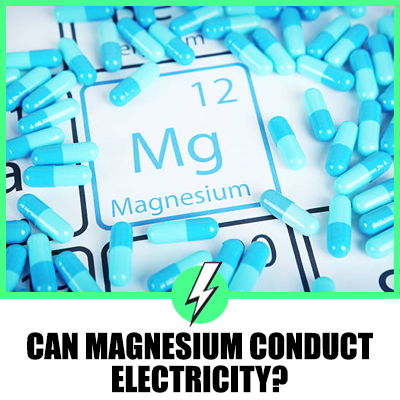Can Magnesium Conduct Electricity?
Magnesium, a chemical element with the symbol Mg, is a shiny gray solid.
It bears a close physical resemblance to the other five elements in the second column (Group 2, or alkaline earth metals) of the periodic table.
It is a versatile and valuable element used in a wide array of industrial applications.
But one question that often arises is: Can magnesium conduct electricity?

Contents
Is Magnesium a Good Conductor of Electricity?
Yes, magnesium is a good conductor of electricity.
This is due to the presence of free electrons that can move around easily.
When a voltage is applied, these free electrons move, creating an electric current.
This is a characteristic of all metals, and magnesium is no exception.
What is the Conductivity of Magnesium?
The electrical conductivity of magnesium is 22.6 x 10^6 S/m at room temperature.
This makes it a reasonably good conductor of electricity, although it is not as good as some other metals such as copper or silver.
The conductivity of a material is determined by the number of charge carriers (in this case, free electrons) and their mobility.
In magnesium, the outermost electrons of the atoms are loosely bound, which allows them to move freely and carry electrical charge.
Why is Magnesium a Better Conductor?
Magnesium is a better conductor than some other materials due to its atomic structure.
Each magnesium atom has two valence electrons.
When magnesium metal is formed, these electrons become delocalized, meaning they are free to move throughout the entire structure of the metal.
This sea of delocalized electrons allows electricity to pass through the metal easily, making magnesium a good conductor.
Is Magnesium a Good or Bad Conductor of Heat?
Magnesium is also a good conductor of heat.
This is again due to the free electrons which can carry thermal energy quickly through the metal.
The thermal conductivity of magnesium is 156 W/(m·K) at room temperature, which is higher than many other metals.
Insights from Online Discussions
Online discussions provide a wealth of additional information on this topic.
For instance, a discussion on Lambda Geeks explains that the conductivity of magnesium is due to the presence of free electrons that can move around easily.
Similarly, a Quora thread confirms that magnesium, like all metals, is a good conductor of electricity.
A post on Tools Week further explains that the conductivity of a material is determined by the number of charge carriers (in this case, free electrons) and their mobility.
In magnesium, the outermost electrons of the atoms are loosely bound, which allows them to move freely and carry electrical charge.
A discussion on Reddit provides an interesting perspective on magnesium hydroxide, stating that it does not conduct electricity in its solid state as it does not have any free ions to act as mobile charge carriers.
In conclusion, magnesium is a good conductor of both electricity and heat due to its atomic structure and the presence of free, delocalized electrons.
Its conductivity makes it a valuable material in many industrial applications.
Magnesium in the UK and US
In both the UK and US, magnesium is widely used in various industries due to its excellent conductive properties.
It’s used in the production of electronics, automobiles, and in construction.
Its lightweight nature combined with its good conductivity makes it an ideal choice for these applications.
In the UK, magnesium is also used in the aerospace industry.
Its high strength-to-weight ratio makes it an excellent choice for parts that need to be both strong and light.
In the US, magnesium is often used in the production of aluminum alloys.
These alloys are used in a wide range of products, from cans to aircraft.
The Future of Magnesium
As we continue to seek out materials that are both efficient and sustainable, magnesium’s future looks bright.
Researchers are exploring new ways to use magnesium in energy storage and transfer, and its use in electric vehicles and renewable energy technologies is likely to increase.
Whether you’re in the UK or the US, understanding the properties of materials like magnesium is crucial.
As we continue to innovate and develop new technologies, materials like magnesium will play an increasingly important role.
In conclusion
Whether it’s conducting electricity or heat, magnesium proves to be a versatile and valuable material.
Its unique properties make it a key player in many of our everyday appliances and will continue to do so in the future.





